The President's Message – 28 April
Hello, I’m Dr Jacqueline Small, President of the Royal Australasian College of Physicians.
I would like to acknowledge the Gadigal people of the Eora Nation as the traditional owners and custodians of the lands I am speaking on today. I extend my respect to all Aboriginal, Torres Strait Islander, and Māori people. Together we restate our shared commitment to advancing Aboriginal, Torres Strait Islander and Māori health and education as core business of the RACP.
We’ve known for decades that we live in highly inequitable societies when it comes to enjoying good health. The health inequities experienced by Indigenous Australians and Māori in Aotearoa New Zealand are well documented.
For example, an Australian Burden of Disease Study found that, in 2018, Indigenous Australians, as a whole, lost almost 240,000 years of healthy life due to ill-health and premature death. That’s equivalent to 289 years for every 1,000 people.
The recent pandemic has highlighted just how widespread health inequities are across all of our communities. You are more likely to die from COVID-19 if you have a pre-existing health condition, and rates of those conditions are elevated among the poor and marginalised.
There is unequivocal evidence for the effect of broader health inequities caused by socioeconomic determinants of health. Many of you will be familiar with the ground-breaking Marmot review in England in 2010. It advocated giving children the best start in life, enabling people to have control over their lives, fair employment, healthy standards of living and sustainable communities – all to ultimately improve health outcomes.
Ten years on, Sir Michael Marmot has revisited this topic. His findings are sobering. For the first time in more than 100 years, life expectancy has failed to increase across England, and for the poorest 10 per cent of women it has actually declined.
Over the last decade, health inequalities have widened overall, and the amount of time people spend in poor health has increased since 2010. Mortality rates are increasing for men and women aged 45 to 49. Child poverty in England has increased; 22 per cent compared to Europe’s lowest of 10 per cent in Norway, Iceland, and The Netherlands.
We’re seeing similar trends here in our two nations – health crises, insufficient money to lead a healthy life, and increasing child poverty.
Health equity is a critical principle that underpins all our College advocacy work. Health Equity is one of six foundational principles of the 2022-2026 CPAC Plan.
We developed a submission to the Australian Treasury’s first round of consultation on their new “Measuring What Matters” statement a few months ago.
In Aotearoa New Zealand, Make it the Norm is a set of policies and recommendations to make health equity the norm by 2040.
Our Indigenous Strategic Framework aims to improve the health and wellbeing of First Nations people in Australia and Aotearoa
However, racism has been under recognised as determinant of poorer health.
Nada Hamad, RACP Fellow and haematologist, writes about structural racism. She says the current sociocultural pressures to re-examine structural racism in society and in medicine, have inspired researchers to question the assumptions that underpin clinical research, and to ask about disparities in health outcomes.
Further, she contends that an intersectional approach that does not solely focus on race – but on other intersectional characteristics such as gender, disability and so on – is likely to be the most efficient way forward.
It is becoming clearer that our health systems also contribute to health inequities with researchers such as Hamed et al reporting the impact of racism in healthcare. Wasserman et al in 2019 wrote of healthcare being an integral determinant of health disparities. These researchers looked at health service system factors, quality of care, payment systems, bias, clinical decision making and patient-clinician interactions.
I believe that the sociocultural pressures that Nada wrote about are also relevant to our College. Our College takes a strong stand against racism. However, it is increasingly apparent that we need to acknowledge the unintended biases that may be experienced by our members.
Recent publications by our members are salient prompts to review our own systems, as well as those of the health services we necessarily work very closely with for Physician Training.
Josephine Thomas, 2023, surveyed Directors of Physician Education in Australia and Aotearoa New Zealand and found that selection into Basic Physician Training (BPT) practices are heterogeneous and as such, raise concern for selection bias.
Vanaja Sabesan and others, including the President of Paediatrics & Child Health Division (PCHD), Nitin Kapur, in 2023 investigated candidates’ demographics on the virtual Multiple Mini Interview (vMMI). Even though the vMMI mean scores were not different across geographic regions, there were differences in being offered training positions. There were also differences in experiences of the quality of the technology.
Addressing structural discrimination and racism continue to be especially important to the work of the College. This includes being open to how our own systems, and those of the health system our trainees, in particular, intersect with, may inadvertently contribute to bias.
 I’d like to finish by acknowledging an outstanding physician and strong advocate, Professor Robert Walker, Head of the Department of Nephrology at Otago, who is this year’s winner of the RACP College Prize.
I’d like to finish by acknowledging an outstanding physician and strong advocate, Professor Robert Walker, Head of the Department of Nephrology at Otago, who is this year’s winner of the RACP College Prize.
Rob is acknowledged for his leadership in the field of nephrology and the demonstrable improvements he has made to the lives of people affected by kidney disease. He’s advocated for improved kidney care both nationally and internationally.
Professor Walker is also recognised as an internationally eminent researcher. He has been appointed the Deputy Chair of the Clinical Research Committee for the International Society of Nephrology (ISN) and serves on the ISN Research Grants Committee.
Rob has been involved in the work of RACP for almost 30 years. This is an astounding contribution to our College community. He holds roles on the RACP Clinical Examination Committee as external examiner to Australia, and participated in the review and update of the nephrology training curriculum. Please join me in congratulating Professor Walker, and thank you for watching.
Dr Jacqueline Small
RACP President
To contact Jacqueline, please email president@racp.edu.au
Editor-in-Chief sought for the Journal of Paediatrics and Child Health
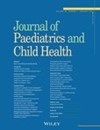 Expressions of interest (EOI) are sought for the Editor-in-Chief of the Journal of Paediatrics and Child Health (JPCH).
Expressions of interest (EOI) are sought for the Editor-in-Chief of the Journal of Paediatrics and Child Health (JPCH).
The JPCH aspires to be a leading peer reviewed scientific journal representing the disciplines of paediatrics and child health for paediatricians in Australia and Aotearoa New Zealand.
The Editor-in-Chief of the JPCH is appointed by the RACP Board for an initial three-year term with the option to renew for a further term and reports to the RACP Board through the College Journals Committee (PDF).
Read more for a position description and to apply
Wherever you are in your career, we’re your CPD Home
 Whether you are a New Fellow, established within your career, or beginning to wind down for retirement, the RACP CPD Home can support you to meet your specialist regulatory requirements.
Whether you are a New Fellow, established within your career, or beginning to wind down for retirement, the RACP CPD Home can support you to meet your specialist regulatory requirements.
We have a long history as an accredited CPD provider within Australia and Aotearoa New Zealand, and our MyCPD team are at hand to provide you with tailored guidance throughout the annual CPD cycle. Plus, your RACP membership means you can access the RACP Online Learning platform for a selection of tools and resources relevant to you throughout your career.
You have never stopped learning, we’re here to make sure that continues. My RACP. MyCPD Home.
Find out more
Complete the 2023 New Fellow Survey to share your experience
 If you were admitted to Fellowship of an RACP Division, Faculty or Chapter Training Program between 2 October 2020 and 31 March 2022, this is your chance to share your experience through this survey.
If you were admitted to Fellowship of an RACP Division, Faculty or Chapter Training Program between 2 October 2020 and 31 March 2022, this is your chance to share your experience through this survey.
You can provide feedback on how your RACP training program has prepared you for unsupervised professional practice and share your experience of the transition from trainee to specialist physician. This helps us to provide tailored support for members and make evidence-informed improvements to our programs.
Don’t miss out on sharing your thoughts. The survey closes on Tuesday, 16 May 2023. Thank you to our Fellows who have participated in the 2023 New Fellow Survey. If you haven’t done so already, please complete the anonymous survey.
Respondents will be offered a chance to win one of three $200 Prezzee gift cards. Visit the website to read the terms & conditions. For more information about the survey, including confidentiality and how the data will be reported, please visit the New Fellow Survey page on the RACP website.
Take the survey
Release of the independent review into Medicare compliance and integrity report
In November 2022, the Honourable Mark Butler MP, Minister for Health and Aged Care, announced the launch of an independent review into Medicare integrity and compliance in response to concerning reports about fraud within Medicare, which was conducted by Dr Pradeep Philip. The primary aim of this review was to consider whether regulation, enforcement and compliance settings are adequately balanced against policy and service priorities.
The review was conducted by Dr Pradeep Philip and the RACP was consulted about the independent review represented by Professor Jennifer Martin (FRACP, PhD) (Chair of the College Policy and Advocacy Council (CPAC) and President-Elect) and Nicola Lewis (Executive General Manager of Policy and Advocacy).
The report has been released recently making a total of 23 recommendations to the government under four themes, some of which are relevant to physicians and trainees. See the summary.
The government is currently considering these recommendations and has indicated that it will work closely with health professionals, patients and peak bodies to develop a comprehensive response.
Detailed findings of this review can be accessed here. The College will be working with the Government on any recommendations that might impact on our members.
Seeking young people to join the RACP Youth Advisory Group
 We are looking for a diverse group of young people aged 18 to 25 years to join the new Youth Advisory Group (YAG) on Youth Appropriate Health Care. The Advisory Group will help inform and develop a new position statement on youth appropriate health care.
We are looking for a diverse group of young people aged 18 to 25 years to join the new Youth Advisory Group (YAG) on Youth Appropriate Health Care. The Advisory Group will help inform and develop a new position statement on youth appropriate health care.
Applications close on Monday, 1 May 2023. Please share this opportunity with your network.
RACP Youth Advisory Group EOI information
2023 winter season advice
 In preparation for winter, the Department of Health and Aged Care is urging the public to get the influenza vaccine and ensure they are up to date with their COVID-19 boosters.
In preparation for winter, the Department of Health and Aged Care is urging the public to get the influenza vaccine and ensure they are up to date with their COVID-19 boosters.
Eligibility criteria for COVID-19 boosters has been updated. All adults can receive a booster vaccination if it has been six months or more since the last COVID-19 vaccine or confirmed COVID-19 infection – whichever was most recent. ATAGI has advised that COVID-19 booster doses can be safely administered alongside influenza and other vaccines.
For more information on 2023 COVID-19 booster doses, please visit the Department website.
RACP Policy & Advocacy quarter 1 (Q1) report
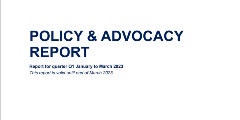 Our Policy & Advocacy Q1 report highlights some wonderful work that our College has accomplished so far this year, together with input from members. The Policy & Advocacy team would like to thank all members for their contributions and support.
Our Policy & Advocacy Q1 report highlights some wonderful work that our College has accomplished so far this year, together with input from members. The Policy & Advocacy team would like to thank all members for their contributions and support.
Please find these P&A reports on the RACP Policy and Advocacy Reports page.
Do you have questions about the Specialist Training Program (STP)?
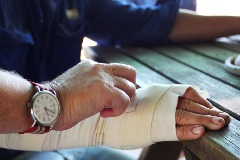 Join us for a webinar designed to provide the latest general information on STP, what STP is, the process of funding, how to apply for funding and much more.
Join us for a webinar designed to provide the latest general information on STP, what STP is, the process of funding, how to apply for funding and much more.
The Specialist Training Program (STP) aims to grow the specialist workforce in these areas long-term:
- Regional, rural and remote areas
- The private health sector
- Non-hospital settings like aged care, community health and Aboriginal and Torres Strait Islander medical services.
Funding through this program supports accredited training settings to establish and expand Specialist Training positions.
For those wishing to expand their knowledge of the program this webinar should not be missed. Register for one of two webinars:
- Tuesday, 9 May 2023, 10am to 11am AEST
- Monday, 22 June 2023, 10am to 11am AEST
Places are limited. Register now
Pomegranate Health podcast: Ep93. The rise and fall of mpox
 Ep93: The rise and fall of mpox
Ep93: The rise and fall of mpox
The first time most of us heard of monkeypox (mpox) was in May 2022. The smallpox-like infection appeared to spring from nowhere and made its way through Europe and then the Americas, largely within the gay and bisexual community. But the first documented human case of mpox actually occurred in 1970 in Central Africa, and it’s been endemic ever since.
Last year’s mpox outbreak eclipsed prior case numbers in just a few months due to a newly evolved strain. The count of confirmed cases totalled over 86,000 all around the world and it’s a testament to well-coordinated community health in the developed world that the outbreak was reigned in within a few months of the index case in Europe.
But alongside this success story, there’s also a cautionary tale about global health strategy. Due to mpox not being taken seriously in endemic countries, an incubator was created for this new strain to emerge.
In this podcast episode we also discuss the stigma associated with sexually transmitted infections and the pros and cons of applying this label.
Guests
- Dr Vincent Cornelisse FRACGP FAChSHM PhD (Royal Prince Alfred Hospital, Royal North Shore Hospital, Sydney; Kirby Institute, University of New South Wales)
- Dr Massimo Giola FRACP FAChSHM PhD (Te Whatu Ora, Tauranga, Rotorua)
Please visit the Pomegranate Health web page for a transcript and supporting references. Login to MyCPD to record time spent listening and reading supporting materials. Subscribe to new episode email alerts or search for ‘Pomegranate Health’ in Apple Podcasts, Spotify, Castbox, or any podcasting app.
Do you have an understanding or expertise on the importance of culturally safe supervision?
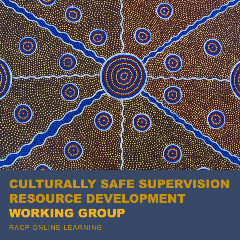 Fellows, trainees and subject matter experts who have an understanding or expertise on the importance of culturally safe supervision are invited to be part of an important new project. Contribute to the development of a suite of online resources to support supervisors to provide culturally safe supervision to Aboriginal, Torres Strait Islander and Māori trainees.
Fellows, trainees and subject matter experts who have an understanding or expertise on the importance of culturally safe supervision are invited to be part of an important new project. Contribute to the development of a suite of online resources to support supervisors to provide culturally safe supervision to Aboriginal, Torres Strait Islander and Māori trainees.
Resources to be developed will include case-based video scenarios, video interviews, webinars, and supplementary resources.
Find out more and apply
RACP Evolve program educational animations
The College’s Evolve Program delivers innovative education in accessible video animations. These animations focus on low value care in specialty practice for busy physicians. The Evolve Program has recently released three animations to complement the following recommendations to reduce low value care:
These and other Evolve Program animations can be viewed on the Evolve website resources page.
The Policy & Advocacy team hosted an Evolve Program exhibition at the Australian Pain Society’s Annual Scientific Meeting from 2 to 5 April 2023. The exhibition served to promote the Australasian Chapter of Addiction Medicine’s (AChAM) Top-5 recommendations and the AChAM animation.
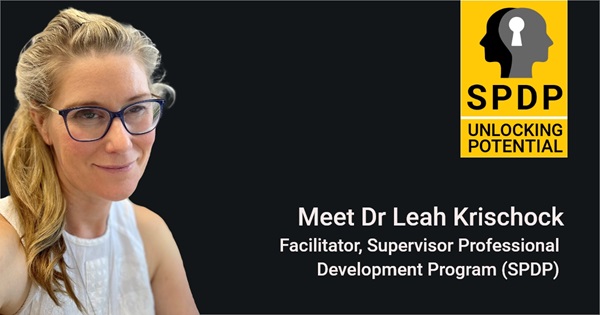
Meet our Supervisor Professional Development Program (SPDP) Facilitator: Dr Leah Krischock
Why do you facilitate SPDP workshops?
I initially became an SPDP workshop facilitator when I became Director of Advanced Training (DAT) at Sydney Children’s Hospital. We run SPDP workshops for our Advanced Paediatric Trainees as part of a series of Professional Qualities Workshops and I saw being a facilitator as an integral part of the DAT role. A side benefit has been the improvement in my facilitation skills, which is useful as I am also a Schwartz Round facilitator for the Sydney Children’s Hospitals Network.
What is the most enjoyable part of your role as an SPDP facilitator?
I enjoy connecting with colleagues within my specialty and with consultants from outside paediatrics. I always take away novel ideas about how to improve when I facilitate a workshop and I value the opportunity to learn about different ways of approaching trainees in difficulty and other challenging situations. Facilitating workshops helps keep my skills up to date and serves as an excellent catalyst for reflection on my clinical and supervisory practice.
Why should your colleagues consider becoming an SPDP Facilitator?
Being an SPDP Facilitator offers the opportunity to have a positive impact outside of patient interactions. By helping improve the quality of trainee supervision, a time investment of a few hours even a few times a year could have positive impact on many supervisors, their trainees and our future clinicians. If you enjoy sharing ideas and learning form others, you should consider becoming a facilitator.
Why do you think your colleagues should complete the SPDP workshops?
Our trainees are the next generation of clinicians. I believe it is important they are supported to achieve their full potential during their training and beyond. I know how excellent supervision can make a huge difference to a trainee and their training experience. SPDP workshops may not by themselves make you the perfect supervisor, but they can offer insights about how to improve your supervision. In my experience, even if some attendees find parts of the workshop a little clunky, the vast majority find the discussion engaging and enjoyable. With three-hour online offerings now available both within and outside of regular work hours, a small-time investment can be a very rewarding and positive experience.
About the SPDP
Register now for a virtual, face-to-face, or online Supervisor Professional Development Program (SPDP) workshop. For more information, visit the website or contact supervisor@racp.edu.au.
Stay informed
Read other RACP eBulletins:
Join the conversation in the ROC